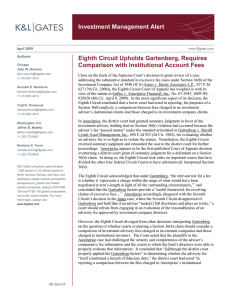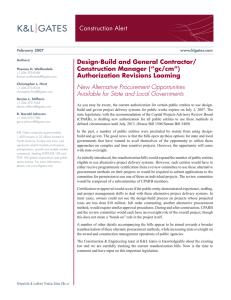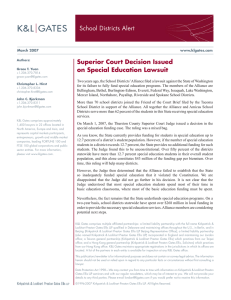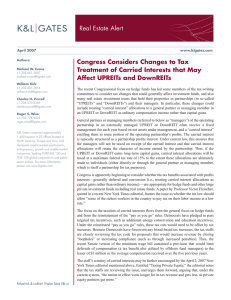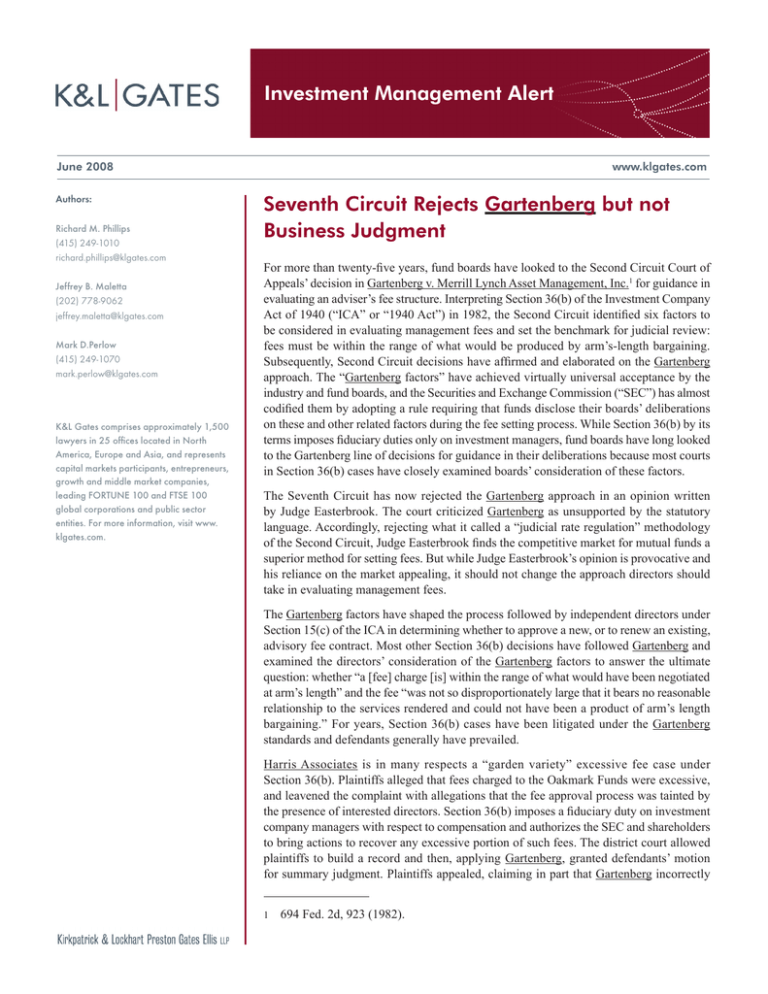
Investment Management Alert
June 2008
Authors:
Richard M. Phillips
(415) 249-1010
richard.phillips@klgates.com
Jeffrey B. Maletta
(202) 778-9062
jeffrey.maletta@klgates.com
Mark D.Perlow
(415) 249-1070
mark.perlow@klgates.com
K&L Gates comprises approximately 1,500
lawyers in 25 offices located in North
America, Europe and Asia, and represents
capital markets participants, entrepreneurs,
growth and middle market companies,
leading FORTUNE 100 and FTSE 100
global corporations and public sector
entities. For more information, visit www.
klgates.com.
www.klgates.com
Seventh Circuit Rejects Gartenberg but not
Business Judgment
For more than twenty-five years, fund boards have looked to the Second Circuit Court of
Appeals’ decision in Gartenberg v. Merrill Lynch Asset Management, Inc.1 for guidance in
evaluating an adviser’s fee structure. Interpreting Section 36(b) of the Investment Company
Act of 1940 (“ICA” or “1940 Act”) in 1982, the Second Circuit identified six factors to
be considered in evaluating management fees and set the benchmark for judicial review:
fees must be within the range of what would be produced by arm’s-length bargaining.
Subsequently, Second Circuit decisions have affirmed and elaborated on the Gartenberg
approach. The “Gartenberg factors” have achieved virtually universal acceptance by the
industry and fund boards, and the Securities and Exchange Commission (“SEC”) has almost
codified them by adopting a rule requiring that funds disclose their boards’ deliberations
on these and other related factors during the fee setting process. While Section 36(b) by its
terms imposes fiduciary duties only on investment managers, fund boards have long looked
to the Gartenberg line of decisions for guidance in their deliberations because most courts
in Section 36(b) cases have closely examined boards’ consideration of these factors.
The Seventh Circuit has now rejected the Gartenberg approach in an opinion written
by Judge Easterbrook. The court criticized Gartenberg as unsupported by the statutory
language. Accordingly, rejecting what it called a “judicial rate regulation” methodology
of the Second Circuit, Judge Easterbrook finds the competitive market for mutual funds a
superior method for setting fees. But while Judge Easterbrook’s opinion is provocative and
his reliance on the market appealing, it should not change the approach directors should
take in evaluating management fees.
The Gartenberg factors have shaped the process followed by independent directors under
Section 15(c) of the ICA in determining whether to approve a new, or to renew an existing,
advisory fee contract. Most other Section 36(b) decisions have followed Gartenberg and
examined the directors’ consideration of the Gartenberg factors to answer the ultimate
question: whether “a [fee] charge [is] within the range of what would have been negotiated
at arm’s length” and the fee “was not so disproportionately large that it bears no reasonable
relationship to the services rendered and could not have been a product of arm’s length
bargaining.” For years, Section 36(b) cases have been litigated under the Gartenberg
standards and defendants generally have prevailed.
Harris Associates is in many respects a “garden variety” excessive fee case under
Section 36(b). Plaintiffs alleged that fees charged to the Oakmark Funds were excessive,
and leavened the complaint with allegations that the fee approval process was tainted by
the presence of interested directors. Section 36(b) imposes a fiduciary duty on investment
company managers with respect to compensation and authorizes the SEC and shareholders
to bring actions to recover any excessive portion of such fees. The district court allowed
plaintiffs to build a record and then, applying Gartenberg, granted defendants’ motion
for summary judgment. Plaintiffs appealed, claiming in part that Gartenberg incorrectly
1
694 Fed. 2d, 923 (1982).
Investment Management Alert
interpreted Section 36(b). The Seventh Court affirmed,
but not on any of the grounds cited by the district court
or argued by defendants.
Judge Easterbrook agreed with the plaintiffs’ position
that Gartenberg is wrong, but not because, as plaintiffs
contend, it relies “too much on market prices as the
benchmark of reasonable fees.” To Judge Easterbrook,
Gartenberg’s flaw is that “it relies too little on markets.”
Judge Easterbrook’s principal objection to the
Gartenberg analysis is that it does not give sufficient
regard to the role of competition in controlling fees.
While Gartenberg does consider fees charged by other
advisors to comparable funds, it emphasizes adviserand fund-specific factors such as the nature and scope
of the services performed, the adviser’s profitability, the
fallout benefits from the adviser’s relationship with the
funds and whether the adviser was sharing economies
of scale from fund growth with shareholders. Earlier
decisions under Section 36(b), including Gartenberg,
had cited the 1970 legislative history to find that no
competition existed for mutual fund advisory services:
therefore, an examination of an adviser’s services,
costs and profits was necessary to determine whether
a fee was excessive.
Judge Easterbrook dismisses this history as
inconclusive and concludes that, in any event, such
distrust is not justified by the competitive conditions
in today’s mutual fund industry. He finds further
support for his analysis in the language of the statute
itself. Section 36(b) “does not say that fees must be
‘reasonable’” but only that the adviser has a fiduciary
duty with respect to management compensation.
Referring to classic sources of fiduciary law, Judge
Easterbrook notes that, when it comes to asking for a
fee, a fiduciary “must make full disclosure” and satisfy
its “obligation of candor in negotiation, and honesty in
performance,” but otherwise it “may charge whatever it
can negotiate.” He points out that others with fiduciary
responsibilities, notably lawyers, may set their own
fees, which clients are free to accept or reject. Advisers
should have the same ability, since investors also have
other options.
Harris Associates recognizes that there might be
some outer boundaries on an advisory fee, but a truly
excessive fee would reveal flaws in process, not in the
market. For example, there could be “compensation so
unusual that a court will infer deceit or the abdication
of responsibility.” But unless the adviser deceived the
trustees or otherwise “hindered their ability to negotiate
a favorable price for advisory services,” the courts may
not substitute their judgment. While competition may
be “weak” at times, according to Judge Easterbrook
“the judicial process is worse” so that “competition,
rather than litigation, must determine the fee under
Section 36(b).”
In his effort to make a point on economic theory, Judge
Easterbrook overstates the actual impact of the courts
in fee setting. Courts have not used Section 36(b)
and the Gartenberg factors to engage in judicial rate
making. To the contrary, in every litigated case that has
involved a decision on a fact record, as opposed to the
allegations in a complaint, courts have rejected Section
36(b) attacks on fees and deferred to the judgment of
the independent directors because they were satisfied
with the thoroughness of the Section 15(c) process.
Indeed, 1940 Act practitioners have long taken the
view that Gartenberg, like the business judgment rule,
emphasizes procedural over substantive requirements:
provided that a careful and conscientious board
considered the Gartenberg factors and reached rational
conclusions, no court is likely to second-guess their
approval. Even before Harris Associates, Section 36(b)
cases were becoming more difficult to mount, as the
recent appellate cases addressing Section 36(b) have set
increasingly tougher pleading standards for plaintiffs
seeking to challenge fees.
Does Harris Associates, with its appealing emphasis
on the market and competitive forces, presage a
change in how directors should approach the fee
approval process? Judge Easterbrook is a wellknown jurist and scholar who is noted for his marketoriented approach to legal issues. While his views
may ultimately have influence, Gartenberg standards
have not been disapproved by any other court, and
many circuits are not sympathetic to the law-andeconomics jurisprudence that Judge Easterbrook’s
opinion represents. In addition, Gartenberg has been
strongly and repeatedly embraced by the SEC. The
agency usually sticks (sometimes stubbornly) with its
historical positions, even in the face of conflicting court
of appeals decisions. The SEC has express statutory
authority to bring Section 36(b) cases, although it has
not done so. It continues, however, to cite Section 36(b)
as a basis for investigation. Moreover, the agency
has further tied itself to Gartenberg by adopting rules
requiring fund boards to disclose their analysis of each
Gartenberg factor.
June 2008 | 2
Investment Management Alert
Judge Easterbrook’s opinion should not be viewed as
inviting independent directors to step aside and allow
the market alone to determine mutual fund management
fees. In discussing fiduciary duty, Judge Easterbrook’s
opinion deals only with that of an adviser proposing
a fee, not with the responsibilities of fund directors
accepting or negotiating the proposal. Taken together,
the ICA and state corporation law require that directors
act for the funds and make an informed business
judgment on how much advisory services are worth
and what to pay for them. A court could well determine
that the absence of a meaningful Section 15(c) process
opens the way for a judgment that the advisory fees
were excessive.
Gartenberg may not be an ideal statement of all factors
that directors should consider. It may understate the
relevance of comparable fees charged in today’s
fund industry in light of the strengthened role of the
independent directors and the increased reliance by
investors on fee based intermediaries who do not
share in advisory fee revenues. Gartenberg also may
overstate the usefulness of advisory profitability
data, particularly in view of the difficulty of devising
meaningful cost allocation methodologies in the
increasingly diversified and complex fund management
business. But Gartenberg is a widely accepted statement
of the types of information and processes that will
yield a reasonable business judgment with respect
to fund management fees. Notwithstanding Judge
Easterbrook’s emphasis on the primacy of disclosure
and competition, directors should continue to engage
in a thoroughgoing Section 15(c) process that considers
the Gartenberg factors, along with other information
the directors deem important, in determining the
reasonableness of management fees.
K&L Gates comprises multiple affiliated partnerships: a limited liability partnership with the full name Kirkpatrick & Lockhart Preston Gates Ellis LLP
qualified in Delaware and maintaining offices throughout the U.S., in Berlin, in Beijing (Kirkpatrick & Lockhart Preston Gates Ellis LLP Beijing
Representative Office), and in Shanghai (Kirkpatrick & Lockhart Preston Gates Ellis LLP Shanghai Representative Office); a limited liability
partnership (also named Kirkpatrick & Lockhart Preston Gates Ellis LLP) incorporated in England and maintaining our London and Paris offices; a
Taiwan general partnership (Kirkpatrick & Lockhart Preston Gates Ellis) which practices from our Taipei office; and a Hong Kong general
partnership (Kirkpatrick & Lockhart Preston Gates Ellis, Solicitors) which practices from our Hong Kong office. K&L Gates maintains appropriate
registrations in the jurisdictions in which its offices are located. A list of the partners in each entity is available for inspection at any K&L Gates
office.
This publication/newsletter is for informational purposes and does not contain or convey legal advice. The information herein should not be used
or relied upon in regard to any particular facts or circumstances without first consulting a lawyer.
Data Protection Act 1998—We may contact you from time to time with information on Kirkpatrick & Lockhart Preston Gates Ellis LLP seminars and
with our regular newsletters, which may be of interest to you. We will not provide your details to any third parties. Please e-mail london@klgates.
com if you would prefer not to receive this information.
©1996-2008 Kirkpatrick & Lockhart Preston Gates Ellis LLP. All Rights Reserved.
June 2008 | 3


